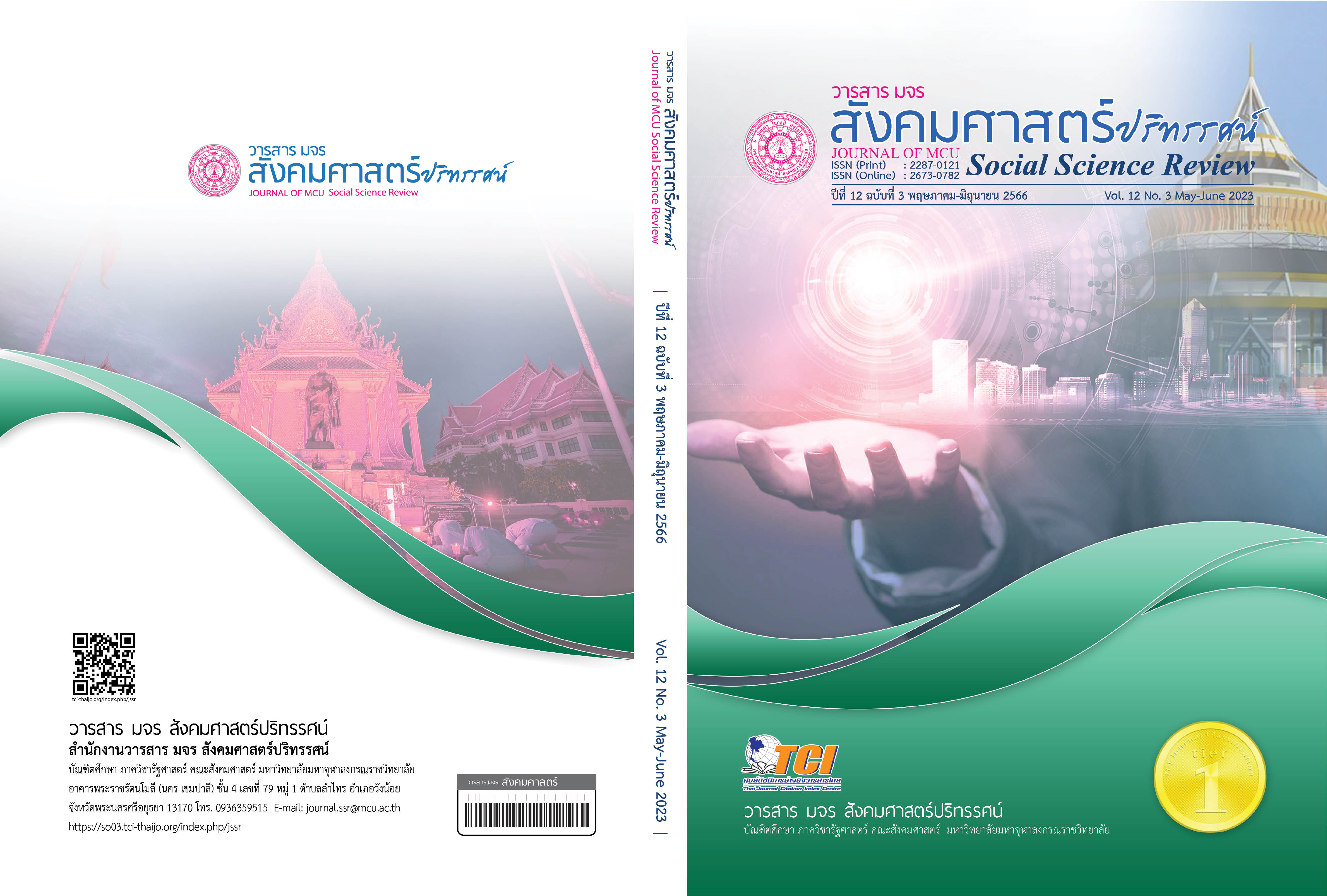บทบาทของรัฐในการจัดการทรัพยากรทางทะเลและชายฝั่ง มองผ่านกระบวนทัศน์ รัฐประศาสนศาสตร์
คำสำคัญ:
บทบาทของรัฐ, ทรัพยากรทางทะเลและชายฝั่ง, กระบวนทัศน์, รัฐประศาสนศาสตร์บทคัดย่อ
รัฐมีบทบาทเกี่ยวเนื่องกับการดำรงชีวิตของประชาชนในด้านต่าง ๆ บทความนี้นำกระบวนทัศน์ทางรัฐประศาสนศาสตร์ตามแนวคิดของสเตฟาน พี. ออสบอร์น มาใช้วิเคราะห์บทบาทของรัฐในการจัดการทรัพยากรทางทะเลและชายฝั่ง โดยศึกษาแนวทางการดำเนินงานของรัฐจากแผนพัฒนาเศรษฐกิจและสังคมแห่งชาติ ตั้งแต่ฉบับที่ 1-12 ทำให้แบ่งบทบาทของรัฐในการจัดการทรัพยากรตามประเภทของกระบวนทัศน์หลักออกเป็น 3 ช่วง คือช่วงที่ 1 ตั้งแต่แผนพัฒนาเศรษฐกิจและสังคมแห่งชาติ ฉบับที่ 1-5 บทบาทของรัฐมีความสอดคล้องกับกระบวนทัศน์การบริหารสาธารณะแบบดั้งเดิม แต่เนื่องจากปัญหาความเสื่อมโทรมของทรัพยากรทำให้ในช่วงที่ 2 ซึ่งตรงกับแผนพัฒนาเศรษฐกิจและสังคมแห่งชาติ ฉบับที่ 6 เป็นรอยต่อความเปลี่ยนแปลงกระบวนทัศน์เพื่อแก้ไขปัญหาที่เกิดขึ้น ดังนั้นในช่วงที่ 3 ตั้งแต่แผนพัฒนาเศรษฐกิจและสังคมแห่งชาติ ฉบับที่ 7-12 จึงมีการปรับเปลี่ยนกระบวนทัศน์หลักในการจัดการทรัพยากร บทบาทของรัฐเป็นไปตามกระบวนทัศน์การจัดการปกครองสาธารณะแนวใหม่ หนุนเสริมด้วยกระบวนทัศน์การบริหารสาธารณะแบบดั้งเดิมและการจัดการภาครัฐแนวใหม่
เอกสารอ้างอิง
กฤษณ์ รักชาติเจริญ. (2557). การจัดการบริการสาธารณะ: จากมุมมองของการพัฒนาการจัดการภาครัฐ. วารสารสังคมศาสตร์บูรณาการ มหาวิทยาลัยมหิดล, 1(1), 21-32.
คณะอนุกรรมการจัดการความรู้เพื่อผลประโยชน์แห่งชาติทางทะเล. (2562). ทะเลและมหาสมุทรและผลประโยชน์ของชาติทางทะเล. กรุงเทพฯ: สำนักพิมพ์คณะรัฐมนตรีและราชกิจจานุเบกษา.
จักรกฤษณ์ นรนิติผดุงการ. (2561). รัฐประศาสนศาสตร์ในประเทศไทย: ทฤษฎีและการปฏิบัติ. วารสารด้านการบริหารรัฐกิจและการเมือง, 7(2), 197-203.
จุลศักดิ์ ชาญณรงค์. (2563). แนวทางการศึกษาพัฒนาการรัฐประศาสนศาสตร์. วารสารรัฐศาสตร์และรัฐประศาสนศาสตร์, 11(1), 115-140.
เจษฎา ทองรุ่งโรจน์. (2559). พจนานุกรมอังกฤษ-ไทย รัฐศาสตร์. กรุงเทพฯ: โสภณการพิมพ์.
ปิยากร หวังมหาพร. (2563). การจัดการปกครองสาธารณะแนวใหม่: มองผ่านนโยบายประชารัฐ. กรุงเทพฯ: โอ. เอส. พริ้นติ้ง เฮ้าส์.
พิทยา บวรวัฒนา. (2546). รัฐประศาสนศาสตร์: ทฤษฎีและแนวการศึกษา (ค.ศ. 1887 – ค.ศ. 1970) (พิมพ์ครั้งที่ 10). กรุงเทพฯ: จุฬาลงกรณ์มหาวิทยาลัย.
ภาวิดา รังษี และ เศกสรรค์ ยงวณิชย์. (2564). บทบาทของสหภาพยุโรปต่อการจัดการประมงพาณิชย์ในประเทศไทย กรณีศึกษา การประกอบอาชีพประมงในจังหวัดระนอง. วารสารวิชาการวิทยาลัยบริหารศาสตร์, 4(2), 1-14.
เรืองไร โตกฤษณะ. (2558). การจัดการทรัพยากรทางทะเลและชายฝั่ง: ทรัพยากรประมงทะเล. กรุงเทพฯ: สำนักงานคณะกรรมการวิจัยแห่งชาติ.
สำนักงานสภาพัฒนาการเศรษฐกิจและสังคมแห่งชาติ. (2525). แผนพัฒนาเศรษฐกิจและสังคมแห่งชาติ ฉบับที่ 5 (พ.ศ. 2525-2529). สืบค้น 15 กรกฎาคม 2564, จาก https:// www.nesdc.go.th/ewt_dl_link.php?nid=3780
อมรา พงศาพิชญ์. (2557). กระบวนทัศน์ สิทธิมนุษยชน และความยุติธรรมในสังคมเปลี่ยนผ่าน. วารสารสังคมศาสตร์, 44(2), 7-20.
อัญชิรญา จันทรปิฎก. (2563). บทวิเคราะห์บทบาทรัฐ-สาธารณะในการจัดบริการสาธารณะตามแนวคิดการร่วมผลิต. วารสารมหาวิทยาลัยราชภัฏยะลา, 15(2), 240-247.
Osborne, S. P. (2006). The new public governance?. Public Management Review, 8(3), 377-387.
Torfing, J. (2012). Governance networks. In D. Levi-Faur (Ed.), The Oxford Handbook of Governance. Oxford: Oxford University Press.
ดาวน์โหลด
เผยแพร่แล้ว
รูปแบบการอ้างอิง
ฉบับ
ประเภทบทความ
สัญญาอนุญาต
ลิขสิทธิ์ (c) 2023 วารสาร มจร สังคมศาสตร์ปริทรรศน์

อนุญาตภายใต้เงื่อนไข Creative Commons Attribution-NonCommercial-NoDerivatives 4.0 International License.
เพื่อให้เป็นไปตามกฎหมายลิขสิทธิ์ ผู้นิพนธ์ทุกท่านต้องลงลายมือชื่อในแบบฟอร์มใบมอบลิขสิทธิ์บทความให้แก่วารสารฯ พร้อมกับบทความต้นฉบับที่ได้แก้ไขครั้งสุดท้าย นอกจากนี้ ผู้นิพนธ์ทุกท่านต้องยืนยันว่าบทความต้นฉบับที่ส่งมาตีพิมพ์นั้น ได้ส่งมาตีพิมพ์เฉพาะในวารสาร มจร สังคมศาสตร์ปริทรรศน์ เพียงแห่งเดียวเท่านั้น หากมีการใช้ภาพหรือตารางหรือเนื้อหาอื่นๆ ของผู้นิพนธ์อื่นที่ปรากฏในสิ่งตีพิมพ์อื่นมาแล้ว ผู้นิพนธ์ต้องขออนุญาตเจ้าของลิขสิทธิ์ก่อน พร้อมทั้งแสดงหนังสือที่ได้รับการยินยอมต่อบรรณาธิการ ก่อนที่บทความจะได้รับการตีพิมพ์ หากไม่เป็นไปตามข้อกำหนดเบื้องต้น ทางวารสารจะถอดบทความของท่านออกโดยไม่มีข้อยกเว้นใดๆ ทั้งสิ้น





